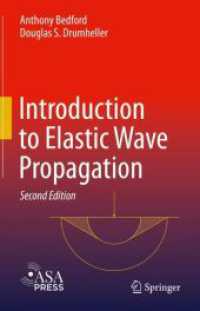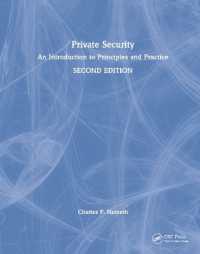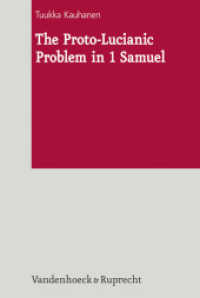- ホーム
- > 洋書
- > 英文書
- > Business / Economics
Full Description
In Money Matters, Richard Gray investigates the discourses of aesthetics and philosophy alongside economic thought, arguing that their domains are not mutually exclusive. The transition in Germany from an agrarian or proto-industrial economy to a capitalist industrial economy, which was paralleled by a shift from the exchange of money in coin to the use of paper currencies, occurred simultaneously with an efflorescence of German-language literature and philosophy. Based on close readings of canonical literary and philosophical texts, Gray explores how this confluence led to a rich cross-fertilization between economic and literary thought in Germany during this period.
Money Matters documents the surprising degree to which literature and philosophy participated in the creation of modern economic paradigms, as well as the extent to which economics influenced literature and philosophy. The cultural artifacts of the period demonstrate the existence of an "economic unconsciousness": persistent notions of value and exchange that inflect the aesthetic and thematic dimensions of literary and philosophical texts. This book offers a thought-provoking and original analysis of literature and ideas in the critical transition period from Kant and Goethe, through the German Romantics, to Marx.
Contents
Introduction
Part One: Economics and Intellectual Culture
Chapter 1 / Buying into Signs: Money and Semiosis in Eighteenth-Century German Language Theory
Chapter 2 / Hypersign, Hypermoney, Hypermarket: Adam Muller's Theory of Money and Romantic Semiotics
Chapter 3 / Economic Romanticism: Monetary Nationalism in Johann Gottlieb Fichte and Adam Muller
Chapter 4 / Economics and the Imagination: Cultural Values and the Debate over Physiocracy in Germany, 1770-1789
Part Two: Literary Economies
Chapter 5 / Counting on God: Economic Providentialism in Johann Heinrich Jung-Stilling's Lebensgeschichte
Chapter 6 / Deep Pockets: The Economics and Poetics of Excess in Adelbert von Chamisso's Peter Shlemihl
Chapter 7 / Red Herrings and Blue Smocks: Commercialism, Ecological Destruction, and Anti-Semitism in Annette von Droste-Hulshoff's Die Judenbuche
Chapter 8 / The (Mis)Fortune of Commerce: Economic Transformation in Adalbert Stifter's Bergkristall
Conclusion / Limitless Faith in the Limitless: Money, Modernity, and the Economics/Aesthetics of Mediation of Goethe's Faust II
Notes
Bibliography
Index








